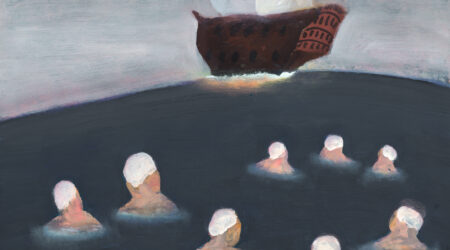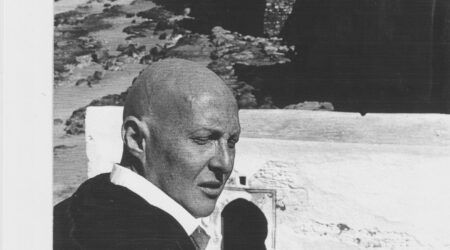Edmund White published his 14th novel—the by-turns-hilarious-and-poignant A Previous Life in which White is a character viewed posthumously by his former lover—in 2022. A new novel, The Humble Lover, is scheduled to be published this spring. Here, the author of the classic 1982 coming-of-age novel, A Boy’s Own Story, soon to be published as a graphic novel, talks about the rise of queer fiction, writing about sex during AIDS, and his favorite reads of 2022.
Aaron Hicklin: Edmund, I’ve always loved your New York apartment with its stacks of books and open fireplace and the art, mostly created by your friends, on the walls. You’ve written many novels here. Talk me through your writing routine.
Edmund White: I have no routine. I just write when I feel like it, sitting right here at my dining room table. I never get up until noon. And I almost never get to start writing until about 4.30 or 5pm.
Aaron: I’ve been marveling at just how prolific you are. As you get older, so you seem to be producing more novels than ever before.
Edmund: Well, I retired from teaching creative writing at Princeton about seven or eight years ago, and that was always a slog because I was living here, but commuting out to there. Although it wasn’t a very hard job, it took up a lot of time. And in this post-Covid period, if that’s what we’re in, all my friends are traveling, so I spend most of my time alone.
Aaron: I’ve always considered you one of the greats of the 20th century, certainly as a prose stylist, but also more critically as a writer who created this extraordinary space for queer fiction at a time when writers were advised against writing about gay characters, creating gay narratives. What gave you the confidence and the conviction to plow on, despite the naysayers?
Edmund: I think I always wanted to write about gay life because I saw it as a kind of original turf. For instance, I wrote my first gay novel when I was 14, unpublished of course… it was called The Tower Window. I wrote it during study hall at my boarding school, and I always thought it would be a good thing to write about homosexuality because I didn’t know anybody who had written about it. Later I came to discover that Andre Gide had written about it, and Gore Vidal, among others. But that wasn’t something I knew about because their books weren’t for sale in Detroit, Michigan, where I was living.
Queer books of the 1950s and ’60s were written for straight readers whereas our books assumed the reader was gay or at least very sophisticated, the way jokes in The New Yorker used to always assume you actually lived in New York
Edmund White
Aaron: I’ve often struggled to distinguish for myself what the distinction is between writing that was published by gay writers earlier in the 20th century, and writers like yourself, who emerged in the 1970s and 1980s, and were at the forefront of contemporary queer writing.
Edmund: Well, one thing is that queer books of the 1950s and ’60s, let’s say, were written for straight readers whereas our books assumed the reader was gay or at least very sophisticated the way jokes in The New Yorker used to always assume you actually lived in New York. You might be reading it in Brighton, but you were supposed to know that there was a new subway stop in New York, and that that was the site for the humor. Anyway, after Stonewall everything was different. People no longer felt the necessity to explain how their characters got to be gay, so there was no etiology on the one hand. And at the same time a bunch of gay publications like Christopher Street and the Harvard Gay and Lesbian Review sprang up, so we knew that books would be reviewed by gay publications, which hadn’t existed for those earlier writers. And then there were lots of gay bookstores; there are fewer now because the big chains decided to carry gay books, but that wasn’t true at the beginning. So there were all these gay bookstores that also served as community centers, and oftentimes they’d have space in the basement where you could have readings or debates or whatever. So all the institutions around gay literature had changed. There were gay publications, there were gay bookstores, and it was before there were gay celebrities, gay actors, or gay athletes. So strangely enough, in America where nobody cares about writers, gay writers were suddenly spokespeople for the gay community, and people cared what you wrote.
Aaron: I imagine a world post-Stonewall of huge creativity where gay men in particular were at the fulcrum of New York’s creative life. As someone who lived in New York at that time, did it feel as exhilarating as it sounds?
Edmund: It was a very creative period. And New York in general was very creative in the 1970s because the rents were low, because it was so violent and there were so many robberies and things, and normal people were afraid to live in Manhattan. It was the era before social media. So gays would have to be out on the street if they were on a cruise—either in a bar or on the street. And since the bars had all been closed in the Sixties, it was a period where you actually encountered people—real people on the real streets—and then took them really to your house. There wasn’t so much virtual reality.
To write about sex during the AIDS era was considered immoral, because your $29 book might encourage a 15-year-old to have sex because he reads about it in your book. Well, that’s absurd. Young people think about sex without the encouragement of literary fiction.
Edmund White
Aaron: One of the things I so admire about your writing is that you are never afraid to put sensuality on the page, even as you’ve gotten older. Is that very conscious on your part? Are you aware of doing that?
Edmund: I think it’s what most critics object to the most, but they always have. I got inured to the criticism early on, but I’ve always been very sex positive. We haven’t mentioned the elephant in the room, which is AIDS because, to write about sex during the AIDS era was considered immoral, because your $29 book might encourage a 15-year-old to have sex because he reads about it in your book. Well, that’s absurd. Young people think about sex without the encouragement of literary fiction, but people like Larry Kramer were very upset with me for being sex positive and writing about sex.
Aaron: Well, perhaps sex positive, but not oblivious to what was happening. You experienced it personally and many of your friends died.
Edmund: I became HIV positive in 85, and so I assumed I’d be dead in a year or two, but for some reason I didn’t die.
Aaron: How did that change the way you saw your place in the world once you were aware that you had survived this plague?
Edmund: I think with a lot of writers, when they knew they were dying of AIDS, they wanted to write all the books they would’ve written if they’d had a long life, even if they had to do it poorly. Me, not. I just stopped writing. I pulled the blankets over my head in total defeat. But then I realized I was what they call a slow progressor, which means that your T-cell count drops only very, very slowly over the years. By the time mine got dangerously low there were all the new treatments, so I was very lucky.
Aaron: There must certainly have been times when you didn’t expect to get this far.
Edmund: Never. No. I thought I would do what we considered an ideal in the 1960s: Live hard, die young, and leave a beautiful corpse.
Aaron: You’ve said of Stonewall, which you experienced directly that it was something you thought of in that moment as “maybe a little silly, more Dada than Bastille.”
Edmund: Yeah, I said it was the first funny revolution because we were all laughing, partly because it seemed so preposterous that we would say gay is good. We had been brought up with everybody telling us how bad we were, and we incorporated that sentiment. I mean, no matter how much fun we would be having, there was a certain point in the evening, pre-Stonewall, where we would all look around and say, “Oh gosh, we’re so sick, we’re sick.” And that was kind of paying lip service to the idea that it was a terrible thing that had befallen us, to be gay. It took quite a long time for people to get over that. And there are many people now, young people, who are being brought up by religious parents, who still think that about themselves.
If you look at, Edgar Allen Poe’s notebooks, he’ll write down a very good idea for a story and then he’ll write in the margin. “Don’t bother, this isn’t original enough.” I wonder how many writers today would submit their work to that kind of rigor?
Edmund White
Aaron: We’re going talk about some of your favorite books of 2022, but I thought it might be helpful to get a sense of the qualities you look for in a good read.
Edmund: Well, I think originality is one thing. If you look at Edgar Allen Poe’s notebooks, he’ll write down a very good idea for a story and then he’ll write in the margin: “Don’t bother, this isn’t original enough.” I wonder how many writers today would submit their work to that kind of rigor? How many people are aware of the absolute demand that a work be original – either original subject matter or original technique or both, but I think that that is a very important thing. Another thing: it should be beautifully written.
Aaron: Taking those requirements into account, originality and beautiful writing, what books caught your attention in 2022?
Edmund: A book that is about to be published, called The New Life by Tom Crewe, who is in his twenties. It’s a debut novel, set in the 1890s in England and it’s about two very brave men who decide to write about sexual perversion, and they are working on it a full steam when the Oscar Wild trial happens. That makes everybody, including the publisher, lose their nerve. Everybody rushes back into their closet or moves to Europe and you can just hear all the closet doors banging shut, because that really deeply frightened all the progressive people in England.
Another book I loved was a biography of Balanchine called Mr. B: Balancing 20th Century, by Jennifer Homans. She was a dancer herself, and so she writes about dance from an insider’s point of view. She danced for Balanchine and she has enormous respect for him, though not a respect that overwhelms her to the point of not speaking the truth. I mean, Balanchine had five marriages, almost all of them difficult, and she records all of that. And then he had a very difficult death and he was very religious, which few of us are, and she deals with that with great respect. And his relationship with Stravinsky was one of the great partnerships in in the 20th century. After Stravinsky’s death, he organized a Stravinsky festival and everybody thought that he was played out because he had been so in love with one of his dancers who had, left him and moved to Paris. And he was brokenhearted. But when Stravinsky died, he got himself together and put on the Stravinsky Festival, some 25 new ballets in 25 days, including many of the works we most admire today. So he rose like a phoenix and he worked almost until his death. The book is marvelous, every part of it.
Aaron: You have a new novel coming out in May. Can you tease it for us?
Edmund: It’s a ballet novel, The Humble Lover, and it’s about a rich older man who falls in love with a ballet dancer and. The ballet dancer is gay but isn’t attracted to older men. But the older man is absolutely desperate anyway. The boy has a quirk that means he can only go to sleep if somebody else is in the bed. So the older man offers the boy his platonic occupancy of the bed, and then they become great friends. And then the boy’s always complaining about not getting big enough roles, and so the older man, who is very, very rich, decides to start a ballet company of his own. But nobody’s that rich. And no matter how rich you are, it ruins you. And it ends with a murder,
Aaron: One has to imagine that a foible such as that—a man unable to sleep unless his bed is occupied—comes from a true life observation.
Edmund: Yes, it comes from my own experience. I lived with a well-known actor, and he couldn’t sleep unless somebody was in the bed with him. He wasn’t attracted to me, but I was horribly attracted to him. And so I spent many years suffering over him. But that’s what I do. I cry over boys.
Aaron: That sounds like torture Edmund.
Edmund: Yeah, that’s what I go for.
This is excerpted from Shelf Life, the Grand Journal podcast. You can hear it in full here, with other guests including John Waters, Joyce Maynard, and Darcey Steinkey, sharing their favorite reads of 2022.






